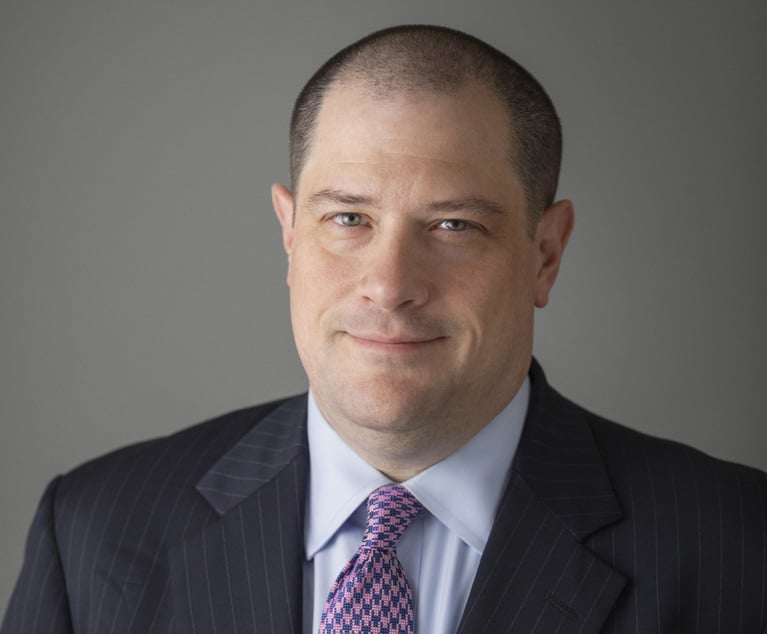 U.S. Department of Justice building in Washington, D.C.
U.S. Department of Justice building in Washington, D.C.Protecting the Privilege in Government Investigations: the Double Bind
Can non-waiver agreements with the government protect the privilege? The courts send mixed signals.
March 29, 2019 at 11:29 AM
5 minute read
Cooperating with the U.S. government during an investigation of potential wrongdoing by your company is supposed to yield tremendous benefits in the form of cooperation credit that theoretically translates into a more favorable outcome. The U.S. Department of Justice's guidance, for example, says that companies can receive “consideration for cooperation” if they “identify all individuals substantially involved in or responsible for the misconduct at issue…and provide to the Department all relevant facts relating to that misconduct.” Such cooperation credit could significantly reduce fines or penalties or even result in a declination.
Most companies, however, ferret out wrongdoing through investigations conducted by counsel, which involve communications made under the protection of the attorney-client privilege. The resulting analysis of evidence contains attorney mental impressions, as well as advice regarding potential risks, exposure and future litigation. In other words, relevant information discovered in an internal investigation often is protected by either the attorney-client or work product privileges.
Although DOJ's current policy does not require that companies waive privilege to be eligible for cooperation credit, DOJ nonetheless requires companies to reveal “all relevant facts.” Companies are left in a bind: how to appease the government without simultaneously waiving privilege over communications and work product that could be used against them in future litigation or subsequent government investigations.
Non-waiver Agreements as a Practical Fix One practical solution has been to enter non-waiver agreements with the government whereby companies share potentially privileged information in exchange for the government's guarantee that the disclosure is not a privilege waiver and the information will be kept confidential. But this approach is still wrought with issues. First, the very essence of privileged communications require that they not be disclosed to others, especially adversarial parties. Second, the government may want to breach the requirement to keep information confidential if the information becomes pertinent to the government's future cases. Finally, third parties may challenge companies' privilege claims to obtain the information in subsequent litigation or investigations.
Mixed Results In cases highlighting the risks of disclosing privileged information, courts around the country have grappled with the effect of non-waiver agreements on potentially privileged information shared with the government.
Some courts have upheld the enforceability of the agreements, finding that privilege remained intact despite disclosures. In one example, In re: Ex Parte Application of Financialright GmbH, a Southern District of New York district court cited the “strong public interest in encouraging disclosure and cooperation with law enforcement agencies,” and explained that “violating a cooperating party's confidentiality expectations jeopardizes this public interest.”
Likewise, in an unpublished 2018 case, In re: Grand Jury, the Fourth Circuit enforced a non-waiver agreement against DOJ while pointing to “important policy considerations,” explaining that “[c]ooperation between private entities and the Government furthers the truth-finding process.” Not enforcing the agreement against the government, the court noted, would “discourage private entities from cooperating with the government in the future.”
Other courts—including the Sixth and Ninth Circuits and the District of Maryland—have found a waiver of the privilege when companies disclosed information to DOJ despite non-waiver agreements. But in In re: Columbia/HCA Healthcare Corp., even though the Sixth Circuit found that the privilege had been waived despite the non-waiver agreement, there was a strong dissent advocating for a “government investigation exception to the third-party waiver rule” to ensure information is shared with the government in future investigations.
Attacks From Multiple Fronts In re: Grand Jury highlights that the DOJ itself may challenge the terms of non-waiver agreements to use information in subsequent prosecutions or litigation. There, DOJ subpoenaed the general counsel of a company to testify before a grand jury about information provided in a prior interview under a non-waiver agreement. Since the Fourth Circuit upheld the non-waiver agreement against DOJ, prosecutors have begun to refuse to enter into broad non-waiver agreements with companies who cooperate.
Companies may also face orders to produce internal investigation documents to defendants in subsequent criminal prosecutions. In the District of New Jersey, in United States v. Blumberg, a defendant argued that his former employer's cooperation required DOJ to search the company's files for exculpatory material. DOJ entered into a plea deal with the defendant before the district court, who seemed sympathetic to the defendant's argument, could rule on the motion.
Third-party plaintiffs bringing civil lawsuits arising from the misconduct that led to the criminal investigation are yet another threat. In Gates Corp. v. CRP Industries Inc., at the defendant's request, a discovery master in the District of Colorado agreed with the defendant that communications between the plaintiff and the government enjoyed no privilege protection and required in camera review of all such communications. Similarly, in In re: Columbia/HCA Healthcare Corp., despite a non-waiver agreement between the defendant and DOJ, a Tennessee district court ordered the defendant to turn over all documents produced to the government on the basis that the defendant had waived privilege over those documents and the Sixth Circuit affirmed.
Until there is further guidance from the courts or DOJ, companies opting to make disclosures should try to limit information to only underlying facts and should be wary of creating presentations or other materials for the government that could later be used against them.
Jessica Heim is a partner in Vinson & Elkins' San Francisco office. Erica Connolly is a senior associate and Meghan Natenson is an associate with the firm.
This content has been archived. It is available through our partners, LexisNexis® and Bloomberg Law.
To view this content, please continue to their sites.
Not a Lexis Subscriber?
Subscribe Now
Not a Bloomberg Law Subscriber?
Subscribe Now
NOT FOR REPRINT
© 2024 ALM Global, LLC, All Rights Reserved. Request academic re-use from www.copyright.com. All other uses, submit a request to [email protected]. For more information visit Asset & Logo Licensing.
You Might Like
View All
Protecting Attorney-Client Privilege in the Modern Age of Communications
6 minute read

Lingering Questions at Supreme Court About Climate Change Litigation Need Resolution
6 minute read
Trending Stories
- 1'That Decision was Wrong:' Federal Judge Rethinks Consumer Protection Class Certification
- 2Bar Report — Dec. 2, 2024
- 3The Impact of Erlinger on Predicate Felony Sentencing Statutes
- 4To Ease Partner Pay Tensions, Some Law Firms Are Seeking 'Middle Ground' in Transparency
- 5How Legal Aid and Tech Collaboration Can Bridge the Justice Gap
Who Got The Work
Michael G. Bongiorno, Andrew Scott Dulberg and Elizabeth E. Driscoll from Wilmer Cutler Pickering Hale and Dorr have stepped in to represent Symbotic Inc., an A.I.-enabled technology platform that focuses on increasing supply chain efficiency, and other defendants in a pending shareholder derivative lawsuit. The case, filed Oct. 2 in Massachusetts District Court by the Brown Law Firm on behalf of Stephen Austen, accuses certain officers and directors of misleading investors in regard to Symbotic's potential for margin growth by failing to disclose that the company was not equipped to timely deploy its systems or manage expenses through project delays. The case, assigned to U.S. District Judge Nathaniel M. Gorton, is 1:24-cv-12522, Austen v. Cohen et al.
Who Got The Work
Edmund Polubinski and Marie Killmond of Davis Polk & Wardwell have entered appearances for data platform software development company MongoDB and other defendants in a pending shareholder derivative lawsuit. The action, filed Oct. 7 in New York Southern District Court by the Brown Law Firm, accuses the company's directors and/or officers of falsely expressing confidence in the company’s restructuring of its sales incentive plan and downplaying the severity of decreases in its upfront commitments. The case is 1:24-cv-07594, Roy v. Ittycheria et al.
Who Got The Work
Amy O. Bruchs and Kurt F. Ellison of Michael Best & Friedrich have entered appearances for Epic Systems Corp. in a pending employment discrimination lawsuit. The suit was filed Sept. 7 in Wisconsin Western District Court by Levine Eisberner LLC and Siri & Glimstad on behalf of a project manager who claims that he was wrongfully terminated after applying for a religious exemption to the defendant's COVID-19 vaccine mandate. The case, assigned to U.S. Magistrate Judge Anita Marie Boor, is 3:24-cv-00630, Secker, Nathan v. Epic Systems Corporation.
Who Got The Work
David X. Sullivan, Thomas J. Finn and Gregory A. Hall from McCarter & English have entered appearances for Sunrun Installation Services in a pending civil rights lawsuit. The complaint was filed Sept. 4 in Connecticut District Court by attorney Robert M. Berke on behalf of former employee George Edward Steins, who was arrested and charged with employing an unregistered home improvement salesperson. The complaint alleges that had Sunrun informed the Connecticut Department of Consumer Protection that the plaintiff's employment had ended in 2017 and that he no longer held Sunrun's home improvement contractor license, he would not have been hit with charges, which were dismissed in May 2024. The case, assigned to U.S. District Judge Jeffrey A. Meyer, is 3:24-cv-01423, Steins v. Sunrun, Inc. et al.
Who Got The Work
Greenberg Traurig shareholder Joshua L. Raskin has entered an appearance for boohoo.com UK Ltd. in a pending patent infringement lawsuit. The suit, filed Sept. 3 in Texas Eastern District Court by Rozier Hardt McDonough on behalf of Alto Dynamics, asserts five patents related to an online shopping platform. The case, assigned to U.S. District Judge Rodney Gilstrap, is 2:24-cv-00719, Alto Dynamics, LLC v. boohoo.com UK Limited.
Featured Firms
Law Offices of Gary Martin Hays & Associates, P.C.
(470) 294-1674
Law Offices of Mark E. Salomone
(857) 444-6468
Smith & Hassler
(713) 739-1250









